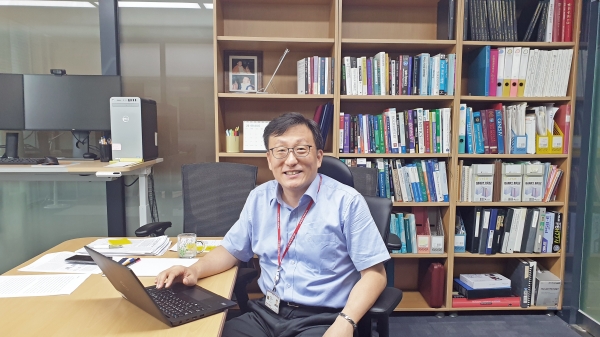
In order to improve the creativity and writing skills of POSTECH members through reading, the “Reading Postechian” program is underway. As part of the program, Professor Kim Sang-uk (LIFE) is publishing a series of book reviews titled “Book Trip with Prof. Kim Sang-uk” on the Tae-Joon Park Digital Library’s website every month. The Postech Times recently interviewed Prof. Kim Sang-uk about his series.
What is the motive behind “Book trip with Prof. Kim Sang-uk”?
It is a campaign introducing interesting books I read. Students need to learn the ability to learn and grow on their own during university years. Students must build wisdom to solve challenging problems through various experiences. This is not something you are taught at university. The best education is teaching yourself constantly, and reading books allows you to do this.
What are the standards for selecting books for “Book trip with Prof. Kim Sang-uk”?
I read about 10 books a week, and there are many good books. In particular, some books make me think, “It would have been great if I had read this book in my 20s.” When I was a young man, I was often nervous due to the uncertainties regarding the future. Sometimes I find the right advice in a good book and realize what I should have done at that time.
I look through new books, recommended books, books mentioned in the media, and bestsellers. Then I browse through books by genre. Finally, I read the books and choose ones to write reviews on.
Please recommend a book to Postechians.
Richard Nisbet’s The Geography of Thought is a book that analyzes the difference between Eastern and Western students in their way of thinking, writing logic, and behavior. Students who want to go to a graduate school of science and engineering to conduct experiments and write papers can learn a meaningful lesson from this book.
Westerners are interested in establishing hypotheses and proving them to find rules; they believe that using formal logic could explain the behavior or phenomenon of objects according to causality. On the other hand, Easterners try to grasp things in the overall context. This characteristic does not fit the science and engineering graduate curriculum, in which it is critical to identify problems in experiments through intense discussions and to debate the legitimacy of the observed rules.
In this book, the author talks about the differences between the East and the West from various perspectives that we have not thought about before. It is necessary to consider deeply about how to develop an active attitude toward academic discussions.
Lastly, please give Postechians some advice.
I often tell the students that good things will happen if they read good books. POSTECH’s library has the best facilities. I hope students visit the library more often.
Furthermore, I will look for good books and introduce them to Postechians in my book review series on the library’s website.


